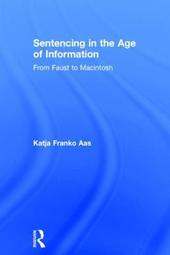
|
Sentencing in the Age of Information: From Faust to Macintosh
Hardback
Main Details
| Title |
Sentencing in the Age of Information: From Faust to Macintosh
|
| Authors and Contributors |
By (author) Katja Franko Aas
|
| Series | Glasshouse S. |
|---|
| Physical Properties |
| Format:Hardback | | Pages:218 | | Dimensions(mm): Height 234,Width 156 |
|
| ISBN/Barcode |
9781904385394
|
| Classifications | Dewey:345.0772 |
|---|
| Audience | | Tertiary Education (US: College) | | Professional & Vocational | |
|---|
| Illustrations |
illustrations
|
|
Publishing Details |
| Publisher |
Taylor & Francis Ltd
|
| Imprint |
Routledge Cavendish
|
| Publication Date |
25 February 2005 |
| Publication Country |
United Kingdom
|
Description
How does the fact that we live in information societies reflect on the nature of penal discourse and practice? Applying media and communication studies to sentencing and penal culture, Franko Aas offers a lucid and innovative account of how punishment is adjusting to a new cultural climate marked by growing demands for information processing, transparency and accountability. The book explores a number of recent penal developments, such as risk assessment instruments, sentencing guidelines and computerised sentencing information systems, and argues that they are instruments of justice with so-called Macintosh traits, offering pre-programmed answers and solutions. The book touches upon issues of decision-making at-a-distance, exercise of discretion, databases, disembodiment and the changing nature of subjectivity. The author explores information technology as a cultural environment with profound implications for the nature of penal knowledge, governance and identity constitution. Sentencing in the Age of Information is essential reading for scholars and students interested in sentencing, penal culture, criminology, sociology of law, and media and communication studies.
Author Biography
Katja Franko Aas is senior researcher at the Institute of Criminology and Sociology of Law at the University of Oslo.
Reviews"This volume is a welcome addition to the sparse literature dealing with sentencing from sociological perspective." - CCJ Volume 6, Issue 2 "'One of the main strengths of the book is the way in which Aas draws on the work of a range of theorists including Foucault, Garland and Feeley and Simon who have developed this approach in the field of criminal justice." - Neil Hutton, University of Strathclyde, UK "It is no easy task to do justice to the many virtues of this book in the space of a review... [Aas'] book's wide-ranging exploration into the practices of penological knowing and deciding will be an example and a point of departure for subsequent researchers in the field. This book would be an excellent choice for any advanced course in penal theory." - Punishment & Society, vol 9 issue 4, October 2007
|